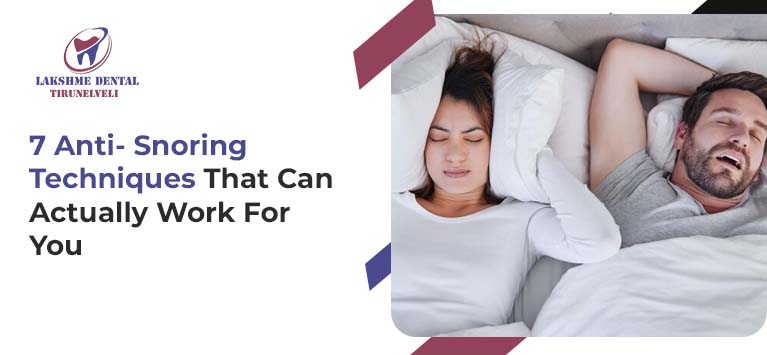
7 Anti- Snoring Techniques That Can Actually Work For You
Tired of the disruptive snores that keep you and your loved ones up all night? Snoring can be more than just an annoyance; it can also affect your sleep quality and overall health. Fortunately, there are proven techniques that can help you put an end to snoring and finally get a peaceful night’s sleep. In this blog post, we will explore effective strategies to silence the snore once and for all.

What causes snoring
Snoring can be a frustrating and disruptive issue, affecting not only adults but also young kids. To effectively tackle snoring, it is crucial to understand its underlying causes. Snoring is the result of a blockage in the airflow through the mouth and nose while sleeping. This obstruction can be attributed to various factors, such as:
1. Anatomy: The structure of the throat and nasal passages can contribute to snoring. For example, a deviated septum or a narrow airway can obstruct airflow and result in snoring.
2. Jaw Position: Improper alignment of your lower jaw can lead to a narrowed airflow passage, resulting in snoring. An underdevelopment or backward positioning of the lower jaw, a condition called Mandibular retrognathia can also be a reason for snoring.
3. Teeth Alignment: Teeth crowding and missing teeth can restrict tongue movement, causing it to fall back during sleep, thereby increasing the likelihood of snoring.
4. Throat Infections: Certain bacterial and viral infections, such as adenoiditis and tonsillitis, can initiate snoring.
5. Nasal congestion: Allergies, colds, or sinus infections can cause nasal congestion, making it harder to breathe through the nose. This can lead to mouth breathing, which induces snoring.
6. Sleep apnea: Snoring can also be a symptom of sleep apnea, a sleep disorder characterized by pauses in breathing during sleep. Sleep apnea triggers the release of chemicals in the brain that induce the relaxation of the tongue muscles and constrict the nasal passages, leading to mouth breathing.
7. Age: Other causes include ageing. This is why snoring is more prevalent in older individuals. As we age, our throat muscles relax and interrupt the airflow
8. Obesity: Excess weight and body fat around the neck and throat can compress the airways, making it difficult for air to pass through freely.
9. Sleeping Position: Sleeping on your back can cause the tongue and soft tissues in the throat to relax and block the airway, resulting in snoring.
10. Alcohol: Consuming alcohol before bedtime can relax the throat muscles, resulting in snoring.
Risk Factors of Snoring
Sleep Deprivation and Daytime Fatigue
One of the most direct consequences of snoring is disrupted sleep, leading to insufficient rest. Daytime fatigue becomes a constant companion, affecting your ability to stay focused, alert, and engaged in daily tasks. Productivity at work or school may suffer, and simple activities can become more challenging when you’re battling drowsiness.
Strained Emotional Well-being
Sleep deprivation can lead to irritability, mood swings, and heightened stress levels, creating tension. The emotional toll of disrupted sleep can extend beyond the bedroom, impacting overall well-being and the ability to navigate social interactions with patience and understanding of others.
Reduced Cognitive Function
Consistent snoring can impair cognitive function, affecting memory, decision-making, and problem-solving abilities. The brain requires quality sleep to consolidate memories and perform essential cognitive processes. Persistent snoring disrupts this crucial function, potentially hindering your ability to perform optimally in academic, professional, or daily life situations.
Increased Health Risks
Beyond the immediate impact on daily activities, chronic snoring may contribute to long-term health risks. Sleep apnea, often associated with loud snoring, is linked to cardiovascular issues, hypertension, and other health concerns. Addressing snoring promptly is not only essential for daily well-being but also for reducing the risk of more severe health complications.
7 Simple Techniques To Control Snoring
Addressing lifestyle changes is significant in managing snoring, as they play a key role in reducing the frequency and intensity of it. Some of the changes that you can follow are,
1. Monitor Your Weight: Keeping a healthy weight is crucial as extra weight, particularly around the neck and throat, can increase snoring. Shedding weight through a well-rounded diet and consistent exercise can effectively decrease snoring.
2. Avoid Alcohol: Alcohol relaxes the muscles in the throat, which can worsen snoring. Limiting or avoiding these substances, especially before bedtime, can make a noticeable difference.
3. Sleeping Position: Sleeping on your side opens airways, reducing snoring by preventing throat tissues from collapsing. Specialized pillows can encourage this position for better sleep quality.
4. Address Allergies and Nasal Congestion: Allergies and nasal congestion can block airflow and contribute to snoring. Use nasal sprays to clear nasal passages for better airflow and a quieter night’s sleep.
Some of the medical interventions to control snoring are medical devices. There are many specialized devices and remedies available that can help silence the snore.
5. Mandibular Advancement Device: Snoring mouthpiece, also known as a mandibular advancement device. These custom-fitted devices work by repositioning the jaw and tongue, opening up the airway and reducing snoring.
6. Tongue Stabilizer: The tongue retaining device is ideal for individuals with non adjustable jaw structures. This soft plastic device surrounds and holds the tongue forward using suction, preventing airway blockage during sleep and reducing interruptions for improved rest.
7. CPAP Device: Utilizing a CPAP (Continuous Positive Airway Pressure) device involves continuous airflow, preventing airway obstruction and minimizing snoring for improved sleep quality. CPAP device combats snoring by delivering a constant stream of air, keeping airways open during sleep. It’s an effective solution for better rest and reduced snoring. There are other various anti-snoring devices available, including nasal strips and oral appliances.
When To Seek Medical Advice
Snoring is a common issue, but it doesn’t have to be a permanent one. By incorporating these anti-snoring techniques into your lifestyle, you can take proactive steps towards a quieter and more restful night’s sleep. Experiment with different methods to find the combination that works best for you. Consider seeking advice from a healthcare professional for personalized guidance if you experience prolonged sleep disturbances. With dedication and the right approach, you can significantly reduce or eliminate snoring, improving both your sleep quality.










